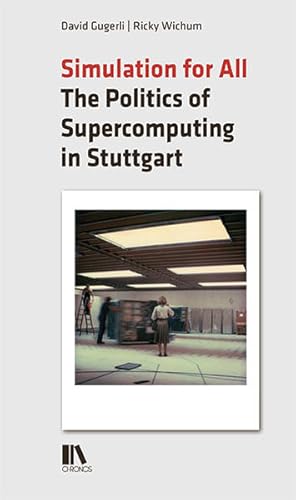simulation politics supercomputing stuttgart (3 Ergebnisse)
FeedbackSuchfilter
Produktart
- Alle Product Types
- Bücher (3)
- Magazine & Zeitschriften (Keine weiteren Ergebnisse entsprechen dieser Verfeinerung)
- Comics (Keine weiteren Ergebnisse entsprechen dieser Verfeinerung)
- Noten (Keine weiteren Ergebnisse entsprechen dieser Verfeinerung)
- Kunst, Grafik & Poster (Keine weiteren Ergebnisse entsprechen dieser Verfeinerung)
- Fotografien (Keine weiteren Ergebnisse entsprechen dieser Verfeinerung)
- Karten (Keine weiteren Ergebnisse entsprechen dieser Verfeinerung)
- Manuskripte & Papierantiquitäten (Keine weiteren Ergebnisse entsprechen dieser Verfeinerung)
Zustand
Einband
- alle Einbände
- Hardcover (3)
- Softcover (Keine weiteren Ergebnisse entsprechen dieser Verfeinerung)
Weitere Eigenschaften
- Erstausgabe (Keine weiteren Ergebnisse entsprechen dieser Verfeinerung)
- Signiert (Keine weiteren Ergebnisse entsprechen dieser Verfeinerung)
- Schutzumschlag (Keine weiteren Ergebnisse entsprechen dieser Verfeinerung)
- Angebotsfoto (3)
Sprache (1)
Preis
- Beliebiger Preis
- Weniger als EUR 20
- EUR 20 bis EUR 45
- Mehr als EUR 45 (Keine weiteren Ergebnisse entsprechen dieser Verfeinerung)
Gratisversand
Land des Verkäufers
Verkäuferbewertung
-
Simulation for All The Politics of Supercomputing in Stuttgart
Anbieter: primatexxt Buchversand, München, Deutschland
EUR 18,95
Währung umrechnenEUR 3,00 für den Versand innerhalb von/der DeutschlandAnzahl: 2 verfügbar
In den Warenkorbgebundene Ausgabe. Zustand: Sehr gut. 156 Seiten Text Englisch - Leichte äußere Mängel - Buch ist als Mängelexemplar gekennzeichnet - Buch ansonsten in sehr gutem und ungelesenem Zustand - Jeder Lieferung liegt eine ordentliche Rechnung mit ausgewiesener MwSt. bei Sprache: Englisch Gewicht in Gramm: 360.
-
Simulation for All | The Politics of Supercomputing in Stuttgart
Anbieter: preigu, Osnabrück, Deutschland
EUR 28,00
Währung umrechnenKostenlos für den Versand innerhalb von/der DeutschlandAnzahl: 1 verfügbar
In den WarenkorbBuch. Zustand: Neu. Simulation for All | The Politics of Supercomputing in Stuttgart | David/Wichum, Ricky Gugerli | Buch | 156 S. | Englisch | 2021 | Chronos Verlag | EAN 9783034016216 | Verantwortliche Person für die EU: preigu, Ansas Meyer, Lengericher Landstr. 19, 49078 Osnabrück, mail[at]preigu[dot]de | Anbieter: preigu.
-
Simulation for All : The Politics of Supercomputing in Stuttgart
Anbieter: AHA-BUCH GmbH, Einbeck, Deutschland
EUR 28,00
Währung umrechnenKostenlos für den Versand innerhalb von/der DeutschlandAnzahl: 2 verfügbar
In den WarenkorbBuch. Zustand: Neu. Neuware - Supercomputing refers to exclusive processing at the outer limit of computability - controversial, politically attractive, and very expensive.David Gugerli and Ricky Wichum explore the development of supercomputing in Stuttgart since 1970, and the surprising twists, operational crises, and new technologies it entailed. For example, who would have expected that expansion of Stuttgart's computing center in the 1970s would be capped off with the installation of an outdated supercomputer Or that the spectacular acquisition of the world's fastest computer in the 1980s would be followed by a years-long quest for users and suitable forms of operation When, in the 1990s, the Internet made global connectivity possible, Stuttgart was at the forefront, flaunting its dominance in a display of transatlantic experiments. Yet the practical question of what to do with supercomputing was ultimately decided at home, in Germany. The proper management of 'users' and extending services to Europe occupied much of the 2000s. By then, previously unanticipated limits to growth had become apparent in the hardware.Told from a history of technology perspective, this study shows that productive supercomputing requires the constant reconfiguring of computers, science, industry, and policy.




